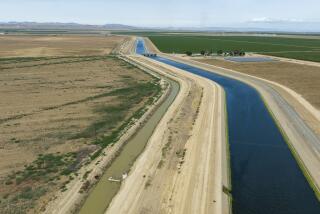Swap Meet Owner Pleads Guilty to Filling Wetlands
- Share via
The owner of the San Ysidro International Swap Meet pleaded guilty Friday to criminal charges of illegally filling a wetlands conservation area for a parking lot, in what federal prosecutors called the first case of its kind in California.
Joseph Garcia, 33, the president of Joseph G. Enterprises, pleaded guilty to filling a 7-acre parcel with dirt for swap meet parking in August, 1990, and faces a fine of up to $25,000 when he is sentenced in federal court next month.
Criminal charges in wetlands cases are rare--only 13 have been filed nationwide--because of the time and cost of identifying violators and proving that damaged areas are indeed wetlands.
The Garcia case took nearly two years to prosecute after a state fish and game warden was tipped to the violation by a county parks official.
State environmental officials said Garcia, in applying for a permit to grade his property, never informed the proper authorities that he would filling a sensitive area only 1,700 feet from the nests of the least Bell’s vireo, an endangered bird species.
“We are not going to exterminate an entire wetland and endangered species for someone to build a business,” said Sandra Gabler, a state fish and game warden. “It was his burden of proof as to what land he was going to take.”
For his part, Garcia said, he believed he was doing a good deed by cleaning the 7-acre property, which was covered with abandoned cars, furniture and other junk when he bought it in May, 1990.
He said San Diego zoning officials informed him that he did not need a permit to fill the area with dirt and that he has been told on several occasions by city officials that the property was not part of a wetlands area.
“Here I thought I was going to get a key to the city, and I get a kick in the butt instead,” Garcia said. “The only wildlife out here is mosquitoes.”
Garcia said he originally leased the property two years before he bought it as part of a larger, 40-acre plot for $1.05 million, on which he planned to build a three-story parking garage for his swap meet. He also put up a fence to block the flow of illegal aliens who pass through the property waiting for alien smugglers.
No garage was built, but Garcia had the land graded and filled with dirt for parking. He also kept stables for his horses on the land.
So far, he said,. he has spent $200,000 on cleanup, legal fees and environmental experts in dealing with the problem.
He has been ordered to mitigate the damage by planting natural vegetation throughout the 7 acres and to grant an easement on the property that will protect it as a wetlands area, Gabler said.
And he faces an April 3 federal sentencing date on his misdemeanor violation that could result in a criminal fine of $2,500 to $25,000.
His attorney, Mark Adams, said Garcia has had to go through “unbelievable government regulation to reclaim an area that has been a footpath for illegal immigration and an industrial waste site.”
Although Garcia’s property is indeed wetlands, Adams said it is only classified as such because it is low-lying land that collects water two weeks a year--the rough definition of a wetland.
Adams speculated that the prosecution is probably tied to recent proclamations by President Bush that the Administration would tolerate “no net loss” of wetlands.
Gabler said Friday’s action has more to do with a San Diego County task force dedicated to finding hazardous waste violations.
“This is how far we will go to get the message out to others,” Gabler said.
The task force also includes the Army Corps of Engineers, U.S. Fish and Game, the FBI, the U.S. Customs Service and 14 other federal, state, county and city agencies.
Melanie K. Pierson, an assistant U.S. attorney, said that, since the task force’s inception in September 1987, it has prosecuted 76 cases, many of them misdemeanor violations, and has collected fines of nearly $2 million and restitution worth $170,000.
“We’ve done clean-water cases, sewer-dumping cases, hazardous-dumping cases, asbestos abatements, you name it,” Pierson said.
More to Read
Sign up for Essential California
The most important California stories and recommendations in your inbox every morning.
You may occasionally receive promotional content from the Los Angeles Times.













